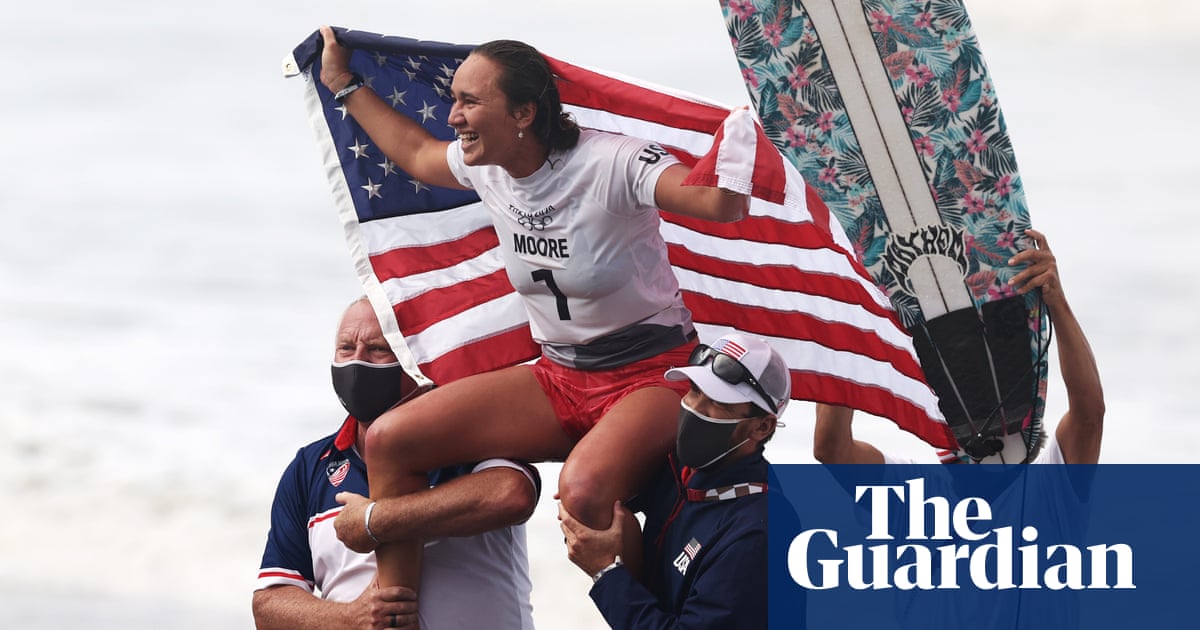
The waves rolled into Tsurigasaki Beach and the curtain came down on a high-flying Games debut for surfing as Brazil’s Italo Ferreira claimed the sport’s first ever Olympic gold medal, and Carissa Moore of the US duly followed suit in the women’s competition.
The spectacular Ferreira, who headed to Tokyo sandwiched in between compatriots Gabriel Medina and Filipe Toledo in a Brazilian top three on the World Surf League rankings, dashed local hopes in the final with a convincing win over Kanoa Igarashi.
Soon after surfing’s inaugural Olympic champion was crowned, Moore made her own piece of history with victory over Bianca Buitendag of South Africa, who had surprised many with her unlikely run to the final.
The arrival of wet and windy conditions off the Japanese coast prompted organisers to bring forward the medal rounds by 24 hours to make the most of the bigger waves on offer, although as the day wore on the swell became choppier and clean rides were few and far between.
And in the men’s final, it was Ferreira who appeared to fare more comfortably with the inconsistent conditions, posting single wave scores of 7.77 and 7.37 for a combined total of 15.14.
A clearly frustrated Igarashi, who was born and raised in Huntington Beach in California but was surfing here on the beach where his father grew up, failed to catch any meaningful waves and ended with a disappointing total of 6.60.
The scenes of Brazilian jubilation as Ferreira was carried up the beach at the conclusion of the match were in stark contrast to the consternation in his camp at the start when, on his first ride, he snapped his board clean in half when attempting an aerial on a huge first wave.
Ferreira didn’t let the incident put him off. “I was super confident,” he said. “When I broke a board I was like, ‘let’s get on the beach and get another board, go back and try again’. And that’s what I did.
“It’s one of the best days of my life for sure. I was so nervous at the beginning but I just tried to surf and have fun because two months ago I was busy with training and thinking and dreaming and now I’ve got the gold medal. The dream came true.”
Moore, a four-times WSL champion, ultimately relied on two high-scoring waves midway through her final to see off Buitendag, who reached the title decider having seen off several big games.
The South African was once ranked as high as fourth in the world, and had said these Games were going to be her last event, but she claimed impressive wins over seven-times world champion Stephanie Gilmore and Caroline Marks on her way to the final.
Moore proved one obstacle too many to overcome though, and the American’s 7.60 and 7.33 scores – a total of 14.93 – eclipsed Buitendag’s combined score of 8.46.
“It’s quite heavy [the medal],” Moore said. “I’m very proud and honoured. It’s been a crazy couple of days, a little bit of a rollercoaster of emotions just trying to figure out the break, find my rhythm, learning how to trust myself without my family here.
“I feel super blessed, super fortunate. It’s been an incredible experience.”
Earlier, Australia’s Owen Wright capped a remarkable comeback from a serious head injury with a bronze medal, in the playoff against Medina, while Japan did get amongst the medals after Amuro Tsuzuki saw off 19-year-old wunderkind Marks to win women’s bronze.
• This article was amended on 28 July 2021 to correct the spelling of Huntington Beach.







